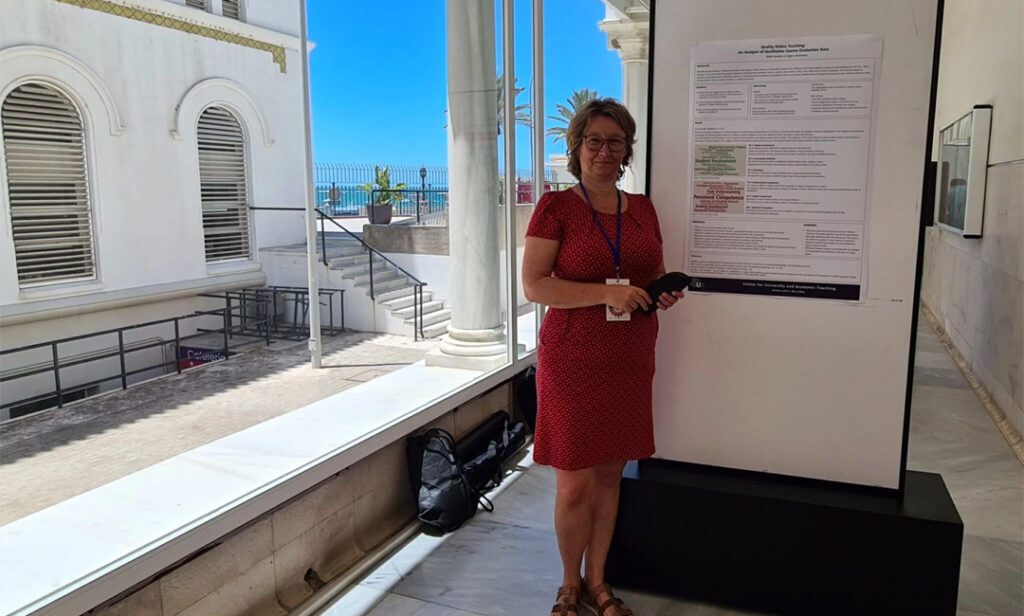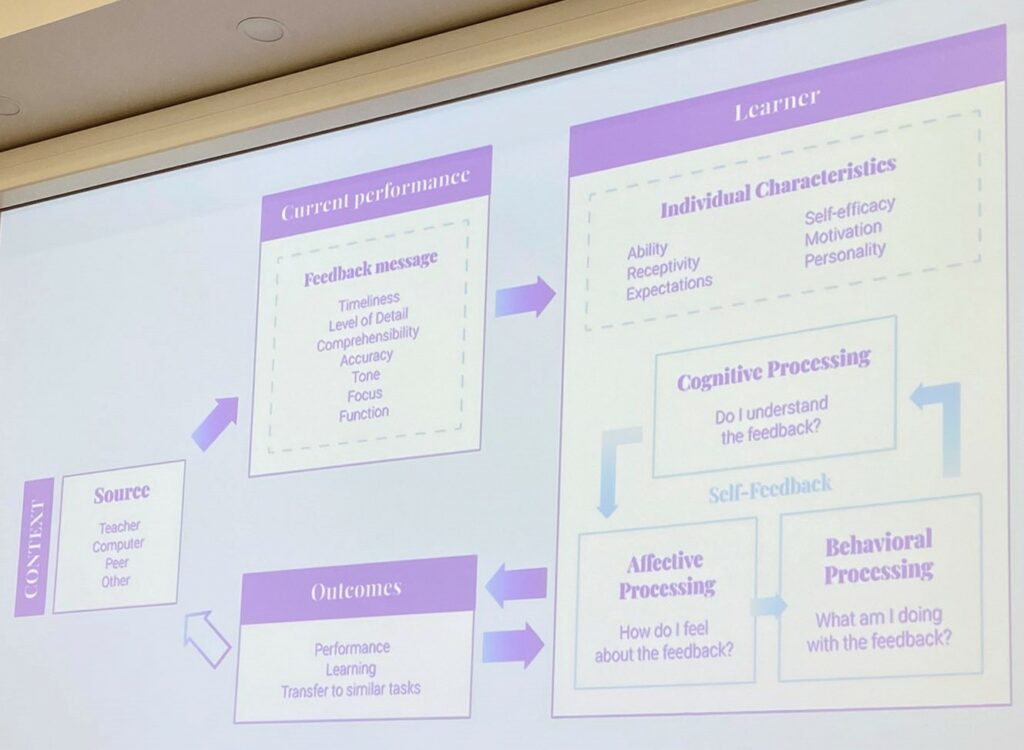After two and a half years of going without, it is finally time: the first specialist conferences are taking place in person again. And with the “Earli SIG 1 & 4 Joint Conference” in Cadiz, we as the editorial team of lehrblick.de could hardly think of a better comeback.
Reduced to the sober facts, the conference can be described as follows:
235 participants with
191 scientific contributions (symposia, paper sessions and poster presentations) and
3 inspiring keynotes on
4 days at
1 grandiose location

Actually, the conference was much more than this: The topic of the conference “Exploring Research Synergies to Learn from Each Other” as a motto for a joint event by two SIGs offered a wide range of opportunities for interdisciplinary exchange. The topics presented were diverse, and alongside the importance of interdisciplinary work, the main focal points were “assessment methods and tools”, “feedback literacy”, “blended-learning and online-learning in HE”, “sustainable, innovative, holistic HE” and “Covid-19 impact”.
Our own contribution – a guided poster presentation – concerned itself with the latter topic. We presented the results of teaching analysis polls in the shadow of the pandemic under the title “High quality teaching in online seminars. An analysis of qualitative evaluation data”.

What additional insights and impressions did we take with us from Cadiz?
Cross-pollinate like bees!
What do apples, cherries and bees have to do with teaching in higher education? More than you might think at first glance: in her keynote address “Breaking out of Our Silos: How High Education Researchers Can Learn with Other SIGs”, Kathleen M. Quinlan pointed out that apples and cherries only develop when bees fly from one plant to another and take care of pollination. This was connected to a call for participants to behave like bees: to leave their own hive (their own SIG) and sniff around in other flowers (engage in exchanges with researchers and instructors from other SIGs) – in doing so, allow for the pollination of others as you “fly by” (come to new insights together).
Quinlan did not simply leave things with a general analogy, however, but rather made her statement more concrete through selected examples from her area of research. Two insights made a particularly lasting impression on us.
Teaching and learning must be considered in relation to the respective discipline
The way in which individual subjects are taught is based to a large extent on the domain-specific convictions and attitudes. The approach which characterizes good instruction differs significantly between the various domains. For example, there is a difference between the convictions that prevail in the liberal arts in comparison to those that apply in Engineering. These convictions are, on the one hand, passed on through a discipline-specific culture of teaching and learning. At the same time, they reflect certain modes of thinking found in the scientific canon of that field. It is only through exchanges between specialist cultures (e.g. through interdisciplinary research or in didactics courses for higher education) that one’s own convictions can be deciphered and a fruitful exchange made possible (e.g. through feedback and forms of review).
Higher education must be considered holistically
In her second example, Quinlan focused on students. They are the ones who will decisively shape the future. Future success in coping with epochal problems, such as climate change, peace and social equality, depends to a large degree on the quality of their education.
The students we are teaching are going to become some of the most privileged members of society. […] And they are going to be the ones that are making the decisions that affect the world’s most pressing problems.
Kathleen M. Quinlan
Quinlan, therefore, sees it as a central task of didactics in higher education to look beyond the boundaries of instructional psychology and look (again) to a greater degree at the insights of pedagogy based in the liberal arts and social sciences. She viewed three goals in particular as essential alongside the purely cognitive education of students:
Critical thinking – Emotional development – Moral education
With this, she placed personality development as a goal of university studies on equal footing with the development of the mind. It is only a holistic education which truly prepares students for their future tasks. To make this successful, it may be necessary to allow more space in curricula for open discussions and unexpected discoveries.
Feedback is everywhere
Feedback and feedback literacy were another focal point at the conference. The conceptual framework for this topic was established by Anastasia Lipnevich in her keynote address “The paradox of feedback: If we don‘t know where we are going, How will we know that we got there?“. She defined feedback as any information which students can use to improve their performance or their learning process. In one model, she first summarized various influencing factors for successful feedback (see Figure 3). Whether and how goal-oriented feedback is depends on at least four factors: (1) the context, (2) the way in which the message is communicated, (3) the processing by the recipient of the feedback and (4) the intended result.

For the individual components, Lipnevich cited numerous studies with surprising results that partly appeared paradoxically at a first glance.
Context matters
From traditional learning contexts, it has been very well demonstrated that elaborated feedback on tasks achieves a greater learning effect than simple feedback (correct – incorrect) or no feedback. These results could not be replicated for feedback in MOOCs.
Be careful with praise
The feedback sandwich is often used to recommend introducing feedback with praise in order to package criticism in a friendlier way. Apparently, there is no evidence that this method is effective. Quite the opposite: praise at the start serves as a primer and the remaining feedback will be interpreted with a positive skew through the lens of the praise. Students who received praise and commentary as feedback showed less learning success than those who only received commentary.
Feedback elicits emotion, and emotions mediate feedback
It is easy to see how positive feedback can generate pride in the recipient, while negative feedback elicits feelings of shame. It is surprising, however, that feedback also depends on the emotions of the one providing the feedback: bored instructors give worse marks and stricter feedback.
In conclusion: two personal insights
In numerous additional sessions, studies with interesting, sometimes surprising, results were presented. With so much input, it is difficult to highlight individual results. Instead, here is a personal insight: Many studies limited themselves to data in a selected domain. In light of the first insight (“Teaching and learning must be considered in relation to the respective discipline”), we could wish for replication studies in a broader context.
Real presence is so much more than “simply being together in a real room” and definitely has a different quality to it for us than virtual presence (and no, that is not only due to the picturesque city by the sea). We are therefore of the opinion that we should welcome a healthy balance of online and offline events in the future.

If you would like to read the impressions, insights and summaries of the other conference participants, as well as the organizational team for the Earli SIG 1 & 4 Joint Conference, search Twitter with the following hashtags: #cadizconference #EarliSig1 #EarliSig4. On the official YouTube channel, you will find recordings of all keynote addresses and symposia.
Suggestion for citation of this blog post
Hawelka, B. & Bachmaier, R. (2022, July 14). Of Apples, Cherries and Bees – Looking back at the Earli SIG 1 & 4 Conference in Cadiz. Lehrblick – ZHW Uni Regensburg. https://doi.org/10.5283/ZHW.20220714.EN

Birgit Hawelka
Dr. Birgit Hawelka is a research associate at the center for University and Academic Teaching at the University of Regensburg. Her research and teaching focuses on the topics of teaching quality and evaluation. She is also curious about all developments and findings in the field of university teaching.

Regine Bachmaier
Dr. Regine Bachmaier is a research associate at the Centre for University and Academic Teaching (ZHW) at the University of Regensburg. She supports teachers in the field of “digital teaching”, among other things, through workshops and individual counseling. In addition, she tries to keep up to date with the latest developments in the field of “digital teaching” and pass them on.





